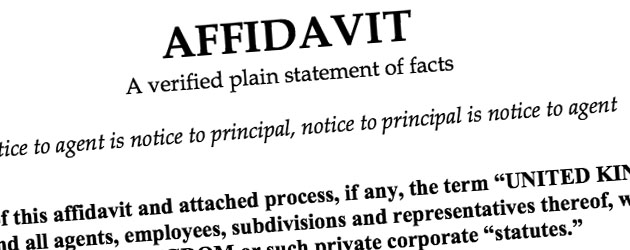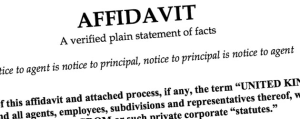This article is written by Tanay Khanna of NULO, Cuttack.
Affidavits are used commonly and for various reasons, but it is not same as an agreement or a contract. Generally, people don’t have a good handle on the definition of an affidavit. There are many occasions when a person comes across an affidavit without his knowledge.
What is an affidavit?
An affidavit is a willingly made declaration in writing, signed by the deponent (person making the affidavit) and accompanied by an oath (vis-à-vis the authenticity of the contents). “Affidavit” has its roots from a Latin word which literally means to “pledge ones faith.” It is to be signed and witnessed (vis-à-vis the genuineness of the affiant’s signature or his identity) by a notary authority. It is also signed without any cross-examination by the affiant. The difference between an affidavit and a deposition is that the former is voluntary but the latter is not.
Another way to think of an affidavit is as a sort of written court testimony. Where, in a court of law, you are required to place your hand on a Holy Book and swear that you’re telling the truth and nothing but the truth, similarly on an affidavit, you do this in writing. You’re under oath, but you’re testimony is on paper. They are important in a way that the oral submission/evidence/testimony is only admissible before a judge but an affidavit can be used as an alternative to this.
However, misleading information in an affidavit can lead to perjury charge against the affiant but if the affiant forgets to include something or omits something then he cannot be penalized for such omission. If the affiant mentions something in the affidavit which is not an established fact or is not backed up by some evidence, then he will have to mention that it is his ‘opinion’.
The law on affidavits in India is governed by Section 139, Order XIX of the Code of Civil Procedure and Order XI of the Supreme Court Rules. Judiciary at many instances have upheld the importance of the veracity of an affidavit by the virtue of the aforementioned rules and sections.
In 1910, Calcutta High Court in the case of Padmabati Dasi v. Rasik Lal Dhar [1]adhered strictly to Order XIX Rule 3 of the CPC and laid down that every affidavit should clearly express how much is a statement of the affiant’s knowledge and how much is a statement of his belief, and the grounds of belief must be stated with sufficient particularity to enable the Court to judge whether it will be correct to rely on such belief.
In another case, M/s Sukhwinder Pal Bipan Kumar and others v. State of Punjab and other [2], this Court reiterated the aforementioned principle and held that under Order XIX, Rule 3 of the Code of Civil Procedure it was mandatory for the affiant to disclose the nature and source of his knowledge and information with sufficient particulars. The Court also held that in a petition where allegations are not affirmed, as aforesaid, it cannot be regarded as supported by an affidavit as required by law.
Mode of attestation of an Affidavit
The Court, Magistrate, or other officer as aforesaid, before whom an affidavit is made, shall certify at the foot of the affidavit the fact of the making of such affidavit before him, and shall enter the date and subscribe his signature to such certificate, and shall, for the purpose of identification, mark, date, and initial every exhibit referred to in the affidavit. The name of the verifying authority must be signed in full, and care must be taken that his proper designation as a Civil Court or Magistrate is added.
Contents of an affidavit
Every affidavit containing any statement of facts shall be divided into paragraphs and each paragraph need to be numbered. It will be more convenient if each paragraph shall be confined to a distinct portion of the subject.
Every person, other than a plaintiff or defendant in a suit in which the application is made, making any affidavit, shall be described in such manner as will serve to identify him clearly that is to say, by the statement of his full name, the name of his father, his profession or trade, and the place of his residence.
When the affiant in any affidavit speaks to any facts within his own knowledge, he must do so positively and directly, using the words ‘I affirm’.
When any particular fact is not within the declarant’s own knowledge, but is specified from information procured from others, the affiant must use the words ‘I am informed’,—and, if such be the case, should add ‘and verily believe it to be true’ – or he may mention the source from which he procured such information. When the statement rests on facts disclosed in documents, or copies of documents procured from any Court of Justice or other source, the affiant shall mention the source from which they were procured, and state his information or belief as to the truth of the facts disclosed in such documents. A sample affidavit can be accessed here.
LawSikho has created a telegram group for exchanging legal knowledge, referrals and various opportunities. You can click on this link and join:
https://t.me/joinchat/J_
 Serato DJ Crack 2025Serato DJ PRO Crack
Serato DJ Crack 2025Serato DJ PRO Crack












 Allow notifications
Allow notifications



[…] View Image More Like This […]